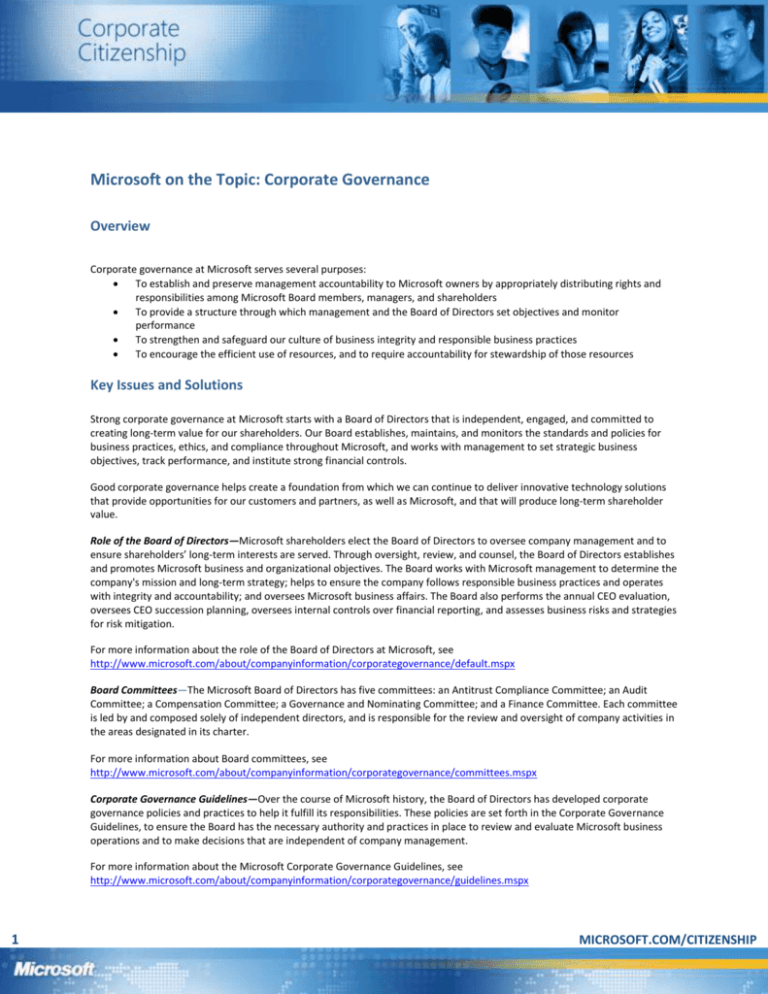
Microsoft on the Topic: Corporate Governance
Overview
Corporate governance at Microsoft serves several purposes:
To establish and preserve management accountability to Microsoft owners by appropriately distributing rights and
responsibilities among Microsoft Board members, managers, and shareholders
To provide a structure through which management and the Board of Directors set objectives and monitor
performance
To strengthen and safeguard our culture of business integrity and responsible business practices
To encourage the efficient use of resources, and to require accountability for stewardship of those resources
Key Issues and Solutions
Strong corporate governance at Microsoft starts with a Board of Directors that is independent, engaged, and committed to
creating long-term value for our shareholders. Our Board establishes, maintains, and monitors the standards and policies for
business practices, ethics, and compliance throughout Microsoft, and works with management to set strategic business
objectives, track performance, and institute strong financial controls.
Good corporate governance helps create a foundation from which we can continue to deliver innovative technology solutions
that provide opportunities for our customers and partners, as well as Microsoft, and that will produce long-term shareholder
value.
Role of the Board of Directors—Microsoft shareholders elect the Board of Directors to oversee company management and to
ensure shareholders’ long-term interests are served. Through oversight, review, and counsel, the Board of Directors establishes
and promotes Microsoft business and organizational objectives. The Board works with Microsoft management to determine the
company's mission and long-term strategy; helps to ensure the company follows responsible business practices and operates
with integrity and accountability; and oversees Microsoft business affairs. The Board also performs the annual CEO evaluation,
oversees CEO succession planning, oversees internal controls over financial reporting, and assesses business risks and strategies
for risk mitigation.
For more information about the role of the Board of Directors at Microsoft, see
http://www.microsoft.com/about/companyinformation/corporategovernance/default.mspx
Board Committees—The Microsoft Board of Directors has five committees: an Antitrust Compliance Committee; an Audit
Committee; a Compensation Committee; a Governance and Nominating Committee; and a Finance Committee. Each committee
is led by and composed solely of independent directors, and is responsible for the review and oversight of company activities in
the areas designated in its charter.
For more information about Board committees, see
http://www.microsoft.com/about/companyinformation/corporategovernance/committees.mspx
Corporate Governance Guidelines—Over the course of Microsoft history, the Board of Directors has developed corporate
governance policies and practices to help it fulfill its responsibilities. These policies are set forth in the Corporate Governance
Guidelines, to ensure the Board has the necessary authority and practices in place to review and evaluate Microsoft business
operations and to make decisions that are independent of company management.
For more information about the Microsoft Corporate Governance Guidelines, see
http://www.microsoft.com/about/companyinformation/corporategovernance/guidelines.mspx
1
MICROSOFT.COM/CITIZENSHIP
Corporate Governance Principles and Practices—The Microsoft Board of Directors is committed to maintaining strong
corporate governance principles and practices. The Board periodically reviews evolving legal, regulatory, and best practice
developments to determine those that will best serve the interests of our shareholders. Examples of changes the Board of
Directors has made to strengthen our corporate governance framework include:
Amending our Bylaws to implement a majority vote standard for director elections. In an uncontested election,
directors will be elected by the vote of the majority of votes cast. In a contested election, directors will be elected by
the vote of a plurality of votes cast. A contested election is one in which the number of nominees exceeds the number
of directors to be elected
Implementing a Policy for Compensation Consultant Independence, which provides that the Compensation
Committee will use a consultant who is independent and devoid of other significant business relationships with
management and Microsoft
Adopting formal stock ownership and holding requirements for Company executives, whereby each executive officer
is required to maintain a minimum equity stake in Microsoft to promote a long-term perspective in managing the
enterprise, and to align shareholder and executive interests
Revising our Corporate Governance Guidelines to further strengthen our Board’s annual evaluation process by adding
individual director assessments in addition to the existing practice of performing Board and Committee assessments
Additional Information
For more information about corporate governance at Microsoft, see
http://www.microsoft.com/about/companyinformation/corporategovernance/default.mspx or the Microsoft 2007
Proxy Statement at http://www.microsoft.com/msft/reports/proxy2007.mspx.
For more information, press only: Rapid Response Team, Waggener Edstrom Worldwide, (503) 443-7070,
mrrt@waggeneredstrom.com
© 2008 Microsoft Corporation. All rights reserved. Contact Us |Terms of Use |Trademarks |Privacy Statement
2
MICROSOFT.COM/CITIZENSHIP






